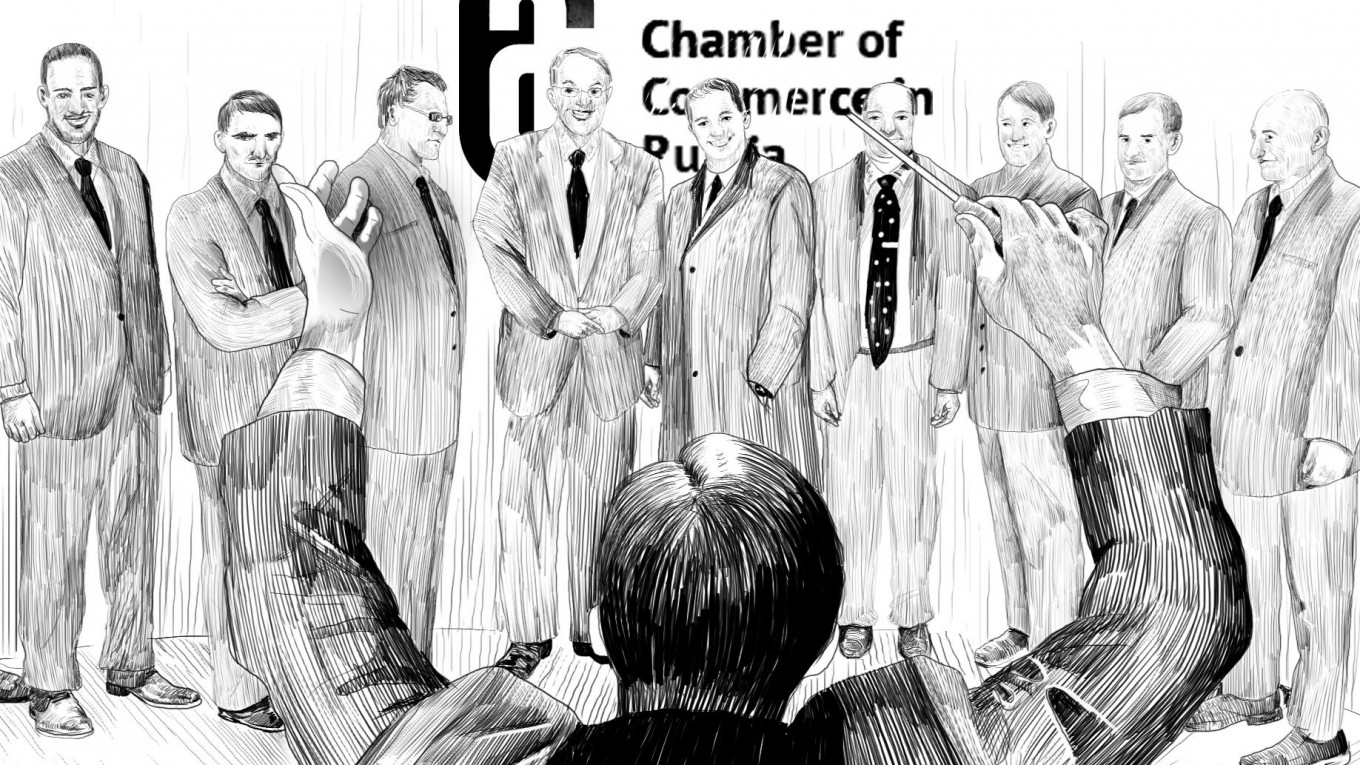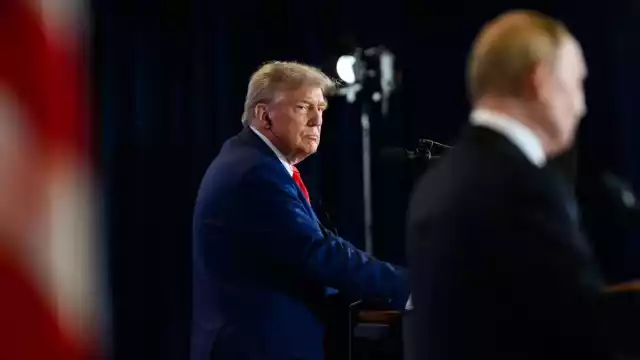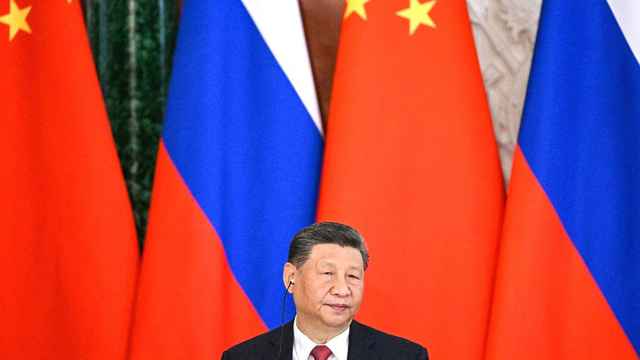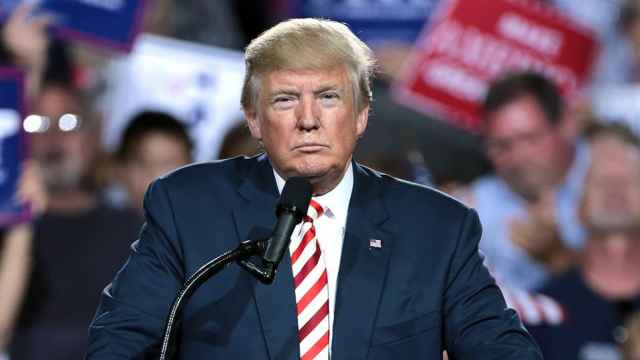In mid-December, with Donald Trump’s ascension to the presidency looming, former Republican congressman Jack Kingston flew to Moscow. Kingston, a senior Trump surrogate, was dispatched to liaise with American firms working in Russia. The topic on everyone’s minds was the U.S. sanctions imposed on Russia in response to its 2014 annexation of Crimea and support for a pro-Russian insurgency in eastern Ukraine.
For the American Chamber of Commerce (AmCham), a nonprofit organization that acts as a lobbying firm for U.S. business interests in Russia, Kingston’s visit was an opportunity to be heard by the incoming administration.
The Chamber’s position was as straightforward as it was predictable: sanctions have harmed U.S. business efforts in Russia and, in any case, have been ineffective.
“There is a change in priorities...of the strategic objectives under the Trump administration,” says Alexis Rodzianko, President and CEO of AmCham. “Business just moved up a few notches, while politics has moved down. We think — we hope — there will now be a more sympathetic ear to U.S. business in Russia.”
Changing Tack
Historically a vocal lobbying group, AmCham has been relatively mute over the past three years as Moscow and Washington clashed over Ukraine. While the change in business environment in 2014 in large part determined AmCham’s embrace of a more subtle, muted tack, the approach is also characteristic of Rodzianko, who took over from chief Andrew Somers in 2013.
One long-time AmCham member, speaking on a condition of anonymity, says that Rodzianko avoids the political: “He plays things quiet, and down the middle.”
Rodzianko, the soft-spoken American-born son of Soviet refugees, is used to playing the role of faithful intermediary. He got his start in U.S.-Russia affairs working as an interpreter for President Jimmy Carter’s negotiating team during the second Strategic Arms Limitation Talks in Geneva. He later moved on to investment banking in Moscow during the 1990s and 2000s.
As the head of AmCham, Rodzianko is charged with representing the collective interests of the American business community. In this capacity, his three years with the organization have not been easy. “Sanctions have been a real wet blanket,” Rodzianko told the Moscow Times.
Complaining to the Obama administration would have been counterproductive because Washington would just pass it off as evidence sanctions were working, Rodzianko says.
Trump on the other hand has given the Russian-American business community an unexpected opportunity. Several times during his presidential campaign Trump signaled he was open to the idea of lifting sanctions against Moscow in a bid to restore relations with the Kremlin. While it remains unclear if Trump will pursue sanctions relief, AmCham is ready to make their case.
“We have some thoughts on paper and have requested an early meeting with the new administration to argue our case,” Rodzianko says. “We are not going to lobby to lift sanctions. We are going to lobby for improved U.S.-Russia relations and [ask] that if you argue with Russia, you don’t use business as a weapon.”
The Cost of Sanctions
The Chamber represents hundreds of American firms working in Russia. Its board of directors is a who’s who of American international corporations — Boeing, Microsoft, Apple, Intel, and ExxonMobil. Almost half of AmCham’s member companies have been in Russia for 21 to 30 years and view the Russian market as strategically important. Half of its members are in the energy and natural resources business — an industry heavily disrupted by sanctions.
While investment in Russia rebounded to $1 billion in 2015, import volumes dropped by 50% compared to 2014. The Chamber does not yet have data compiled for 2016.
AmCham has been critical of the excesses of the U.S. sanctions regime, which Rodzianko says have had unintended consequences for firms operating in Russia. And much of the organization’s work has focused on helping its members understand and lobby against aspects of the sanctions.
The most recent example came on Dec. 29, when Obama signed his final sanctions order against Russia. The sanctions, which placed a moratorium on working with the Russian Federal Security Service (FSB), were drawn up in response to Russia’s alleged interference in the 2016 Presidential Election.
According to Rodzianko, the sanctions — which were modified on Feb. 2 — were drawn up hastily and without thought.
“Naming the FSB means literally if you are US citizen, then crossing the border is against sanctions, because you are receiving a service from the FSB — border guards are a department of the FSB,” Rodzianko says. “The FSB also issues licenses for electronics, so if you have a new chip, a new phone, a new piece of software, it has to be approved by the FSB: so theoretically, we are done — Microsoft, Intel, and Apple are all in trouble.”
On Feb. 2, the U.S. Treasury Department announced that it was amending the sanctions against the FSB to allow American electronics companies to again import electronics to Russia — something AmCham was explicitly lobbying OFAC to address.
Since 2014, AmCham has seen its remit drastically change. From a broad lobbying organisation, focused on business reforms in Russia, it has become a liaison body between American firms and the U.S. Office of Foreign Asset Control (OFAC), which administers sanctions. It writes letters to the OFAC on behalf of American firms in order to resolve issues that unnecessarily hinder their work.
AmCham also works with the Russian government to ensure that Russian counter-sanctions and counter-actions, such as the ban on foreign ownership of mass media outlets, do not impact the operations of international companies. This has come to dominate the Chamber’s work over the years, Rodzianko says.
One long-time member of the foreign business community says the Kremlin also uses AmCham as its direct line to foreign corporations, and vice-versa. In this way, the organization is an effective insurance mechanism for international corporations operating in the sometimes opaque Russian business environment.
Lobby By Proxy
For the moment, the visit by Trump surrogate Kingston is the only acknowledged contact the group has had with the new regime. Both sides have been evasive about these discussions.
A Dec. 12 statement on AmCham’s website says Kingston briefed the group on “doing business with the U.S. under the [Trump] Administration, touching on the challenges and opportunities that may lie ahead.” A representative for Squire Patton Boggs, the law firm Kingston represents, declined to elaborate on the discussions he had with AmCham in Moscow.
Rodzianko, for his part, says the group informed Kingston that AmCham doubts the effectiveness of sanctions in altering Russian policy toward Ukraine. Moscow’s September 2015 intervention in the Syrian civil war — widely interpreted as a bid to force the US to make a deal on sanctions — was likely encouraged by the sanctions, he argues.
But when asked directly about AmCham’s official position on sanctions, Rodzianko plays it right down the middle: “It is of course our stated desire [to see sanctions lifted], but it is not a policy position —that is beyond our scope.”
A Message from The Moscow Times:
Dear readers,
We are facing unprecedented challenges. Russia's Prosecutor General's Office has designated The Moscow Times as an "undesirable" organization, criminalizing our work and putting our staff at risk of prosecution. This follows our earlier unjust labeling as a "foreign agent."
These actions are direct attempts to silence independent journalism in Russia. The authorities claim our work "discredits the decisions of the Russian leadership." We see things differently: we strive to provide accurate, unbiased reporting on Russia.
We, the journalists of The Moscow Times, refuse to be silenced. But to continue our work, we need your help.
Your support, no matter how small, makes a world of difference. If you can, please support us monthly starting from just $2. It's quick to set up, and every contribution makes a significant impact.
By supporting The Moscow Times, you're defending open, independent journalism in the face of repression. Thank you for standing with us.
Remind me later.






